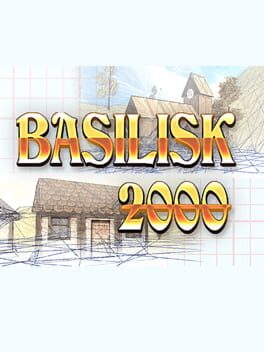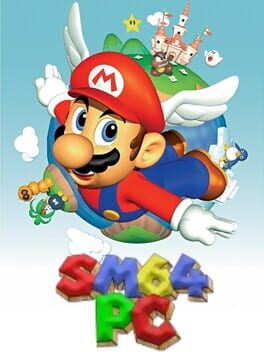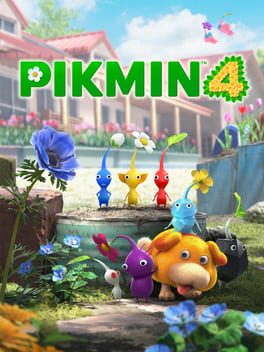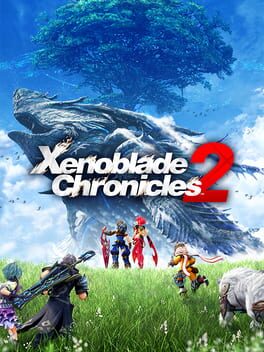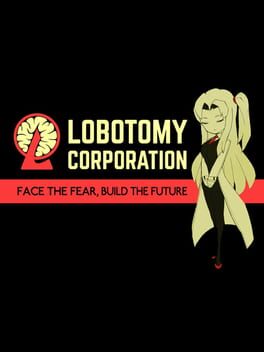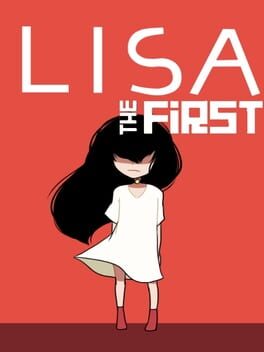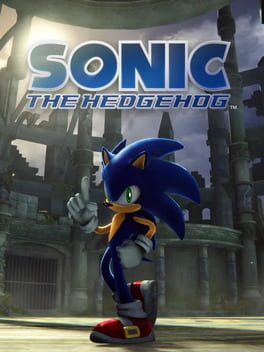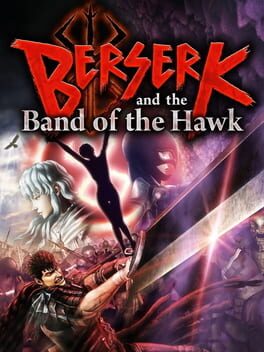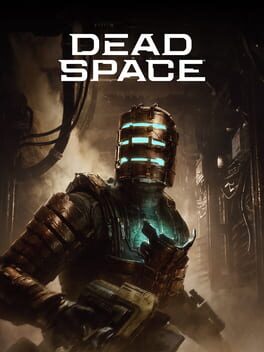Goffers
2023
This review contains spoilers
Really awesome concept and eerie without going too overboard, I found the IRL plot/ARG to be a little goofy but found the act of exploring an abandoned game to be really enthralling.
If I can make one nitpick: having a VERY easily accessible NPC give you the name of an area that's just a bunch of dumb skeletons doing 2020s meme poses is about the quickest way to pull me out of a game ever. Hard to get too invested in the lore of exploring an unfinished 2000 PC RPG when you walk into a room with a skeleton dabbing and another one with the dialog "sus". Wasn't funny enough to warrant briefly breaking the game's tone, especially with how good a job it does pulling you into the concept.
If I can make one nitpick: having a VERY easily accessible NPC give you the name of an area that's just a bunch of dumb skeletons doing 2020s meme poses is about the quickest way to pull me out of a game ever. Hard to get too invested in the lore of exploring an unfinished 2000 PC RPG when you walk into a room with a skeleton dabbing and another one with the dialog "sus". Wasn't funny enough to warrant briefly breaking the game's tone, especially with how good a job it does pulling you into the concept.
2004
2022
Even ignoring that OOT is itself a near perfect game, the slew of options and fixes as well as the addition of a randomizer make this the definitive OOT experience.
It's so obvious that the devs just love this game to death and want to see it preserved for future generations in the most pristine way possible. It's a labor of love of insane proportions, and it makes Nintendo's own glitchy emulation downright embarrassing by comparison. I hope an eventual Majora port can turn out even half as good.
It's so obvious that the devs just love this game to death and want to see it preserved for future generations in the most pristine way possible. It's a labor of love of insane proportions, and it makes Nintendo's own glitchy emulation downright embarrassing by comparison. I hope an eventual Majora port can turn out even half as good.
Mfs talking about being a pacifist and avoiding unnecessary fighting or perpetuating an eternal conflict until they're offered exactly two noppon coins to side with a Keves squad and wipe out a bunch of Agnus soldiers.
I get a lot of RPGs are guilty of this shit but like, did the game designers and the writers ever actually interact with each other during development? It's so blatantly contradictory that it makes me less willing to engage with the story seriously.
Picking which group of soldiers you're going to slaughter based on which side offers better rewards for you in this anti-war game just goes to remind me why the phrase "ludonarrative dissonance" has become such a hot topic in the medium.
I get a lot of RPGs are guilty of this shit but like, did the game designers and the writers ever actually interact with each other during development? It's so blatantly contradictory that it makes me less willing to engage with the story seriously.
Picking which group of soldiers you're going to slaughter based on which side offers better rewards for you in this anti-war game just goes to remind me why the phrase "ludonarrative dissonance" has become such a hot topic in the medium.
2023
Good game, but I just cannot get over how patronized I feel while playing this game, and in the worst possible way. The amount of time I've spent in my playthrough wrestling the controls due to the reticle snapping to something I didn't want is too frustrating to ignore. I think this might be one of the most frustrating control schemes I've ever dealt with, not because it's outright broken, but simply for how often it wants to wrestle control away from you. I got Pikmin killed because the reticle would snap away from what I aiming at to something completely different and I failed Dandori challenges by a matter of seconds due to spending a good chunk of the time correcting issues the autoaim created. The game wants to make aiming easier, but it fails spectacularly and makes it a worse controlling game than the two decade old Pikmin 1, which was far from perfect itself.
It doesn't help that the messages from your new roster of side characters will pester you while you're fighting the controls. This used to be a series in which you could wipe out dozens of your Pikmin and the game wouldn't say a word, because the act of these cute little creatures dying from your negligence spoke for itself as a bad thing. Now your obnoxious peanut gallery will chime in to lament your failure if so much as a single pikmin died, as if Nintendo thought you'd forget that you don't want your Pikmin to die. Imagine if every time you took damage in something like Metal Gear, someone would chime in on the Codec just to say "Poor Snake..." (on second thought, don't imagine that scenario, because that would be very funny).
The rewind feature is handy in caves where you're probably going to reset after major losses anyway, but wholly unnecessary in the overworld where your punishment for losing pikmin is supposed to be that you have to work to build their population back up. This is a game that wants to baby you as much as possible, and that wouldn't be an issue if this stuff was optional. I would love a feature to disable rewind outright when I begin a playthrough, turn off the additional dialogue, and most of all I would love if I could be trusted to actually aim my reticle myself.
And it's funny because in spite of this stuff the game is great fun. It features close to everything I would want in a Pikmin sequel. It should be a testament to how solid the foundation of this game is that I still scored it highly despite how angry it often made me. I can very easily get over annoying popups from characters or ignore the rewind feature, but one thing Nintendo made 100% sure to do was make sure I couldn't actually control the game how I wanted to, and that affects EVERY aspect of gameplay. I wanted to adore this game, but Nintendo decided they don't trust me to play the game correctly, so I couldn't. When it works, it's perhaps the peak of the series, when it doesn't, it's downright maddening.
It doesn't help that the messages from your new roster of side characters will pester you while you're fighting the controls. This used to be a series in which you could wipe out dozens of your Pikmin and the game wouldn't say a word, because the act of these cute little creatures dying from your negligence spoke for itself as a bad thing. Now your obnoxious peanut gallery will chime in to lament your failure if so much as a single pikmin died, as if Nintendo thought you'd forget that you don't want your Pikmin to die. Imagine if every time you took damage in something like Metal Gear, someone would chime in on the Codec just to say "Poor Snake..." (on second thought, don't imagine that scenario, because that would be very funny).
The rewind feature is handy in caves where you're probably going to reset after major losses anyway, but wholly unnecessary in the overworld where your punishment for losing pikmin is supposed to be that you have to work to build their population back up. This is a game that wants to baby you as much as possible, and that wouldn't be an issue if this stuff was optional. I would love a feature to disable rewind outright when I begin a playthrough, turn off the additional dialogue, and most of all I would love if I could be trusted to actually aim my reticle myself.
And it's funny because in spite of this stuff the game is great fun. It features close to everything I would want in a Pikmin sequel. It should be a testament to how solid the foundation of this game is that I still scored it highly despite how angry it often made me. I can very easily get over annoying popups from characters or ignore the rewind feature, but one thing Nintendo made 100% sure to do was make sure I couldn't actually control the game how I wanted to, and that affects EVERY aspect of gameplay. I wanted to adore this game, but Nintendo decided they don't trust me to play the game correctly, so I couldn't. When it works, it's perhaps the peak of the series, when it doesn't, it's downright maddening.
I shelved this game about 2 years ago when I got to the final area after one of the worst cases of burnout I've ever had from a game, every fight was beginning to require the dexterity of some early game bosses and I couldn't play the game for more than an hour at a time, so I shelved it until I felt like I had the dedication to finish that final stretch. Coming back to this game, remembering next to nothing about it's gameplay systems, makes me feel like I'm going insane. Every single battle feels like I'm about to have a heart attack, and there is ZERO chance I'm starting from the beginning and doing it all over.
If you want to argue this is one of the most deep and complex battle systems in an RPG, I'd certainly agree, but those complexities aren't always to the game's benefit. You could cut every aspect of this game in half and probably end up with a better experience overall.
Whether it be in gameplay or otherwise, for every single aspect of Xenoblade Chronicles 2, it feels like there's about twice as much of it as there should be. I still enjoyed my time with it, but I can't help thinking about how much I felt like it was wasting my time just to pad out an already absurdly long game.
If you want to argue this is one of the most deep and complex battle systems in an RPG, I'd certainly agree, but those complexities aren't always to the game's benefit. You could cut every aspect of this game in half and probably end up with a better experience overall.
Whether it be in gameplay or otherwise, for every single aspect of Xenoblade Chronicles 2, it feels like there's about twice as much of it as there should be. I still enjoyed my time with it, but I can't help thinking about how much I felt like it was wasting my time just to pad out an already absurdly long game.
2023
Nintendo has outdone themselves by making an aiming system worse than the one they made over twenty years ago with Pikmin 1. Please make all of my decisions for me, Nintendo. I was stupid for ever wanting any semblance of control over the cursor, please play the game for me, and do so very poorly!
Lacking fluidity in many of its systems; constant interruptions combined with constant cursor jumping combined with constant radio chatter make this one of the most annoying games Nintendo has put out in a while.
I'm still really enjoying it, but WOW do I hate being treated like a toddler at every opportunity. Just let me CHOOSE to turn off some messages or the auto target.
Lacking fluidity in many of its systems; constant interruptions combined with constant cursor jumping combined with constant radio chatter make this one of the most annoying games Nintendo has put out in a while.
I'm still really enjoying it, but WOW do I hate being treated like a toddler at every opportunity. Just let me CHOOSE to turn off some messages or the auto target.
2018
This review contains spoilers
We must embrace pain and burn it as fuel for our journey
Some of the best gameplay/narrative cohesion I've seen in a game. Lobotomy Corporation is a game all about managing a series of ever increasing worst case scenarios that culminates in an absolutely brutal final stretch that left me hobbling towards the finish line with only a third of the employees I'd spent so many hours training.
Unfairness and brutality are a core facet of this game. The only way to understand many of the horrible monstrosities you're tasked with managing is by throwing your employees at them and letting their deaths help you to formulate your strategy. Abnormalities have conditions that are generally easy to manage in isolation, but where the game gets truly sadistic is in managing multiple abnormalities with overlapping and often contradicting rules. One requiring a number of sacrifices per meltdown while another will wreak havoc after enough employees have died. One abnormality may require you to never have your camera on it while it's being worked on, whereas another may require you to keep your camera on it the whole time. Juggling all these different challenges will truly put a test to your ability to micromanage, and just when you think you've got it all under control, you'll remember you haven't checked Express Train to Hell in a couple minutes and a ghost train will rip through your facility and kill half your team.
The olive branch extended to you is the rewind feature, allowing you to rewind back to a previous day or even the beginning of the game while retaining your abnormality information and equipment, as well as your mission progress (that last one I was ignorant to until about 35 days into my first cycle, having failed to complete a single core suppression). I had to do two full resets before reaching the true ending, and while losing my employees was a harsh blow, the gains were too big to ignore. Cleverly, the game even ties this rewind mechanic directly to the story, recontextualizing what I initially thought to be a fail state into an expected aspect of my journey.
The best aspect, however, was the core suppressions; which put to the test nearly every skill you learn in your playthrough in interesting ways while often providing some great insight into your colorful cast of coworkers. My favorite of all has to be Hokma's suppression, the mechanics behind it and how they relate to his personal mindset and feelings was a particular highlight for me. When I tried to speed up time during this event and was met with a message telling me that we "mustn't let time pass recklessly", it hit me way harder than expected.
And can we talk about the music? The core suppression music is always a perfect representation of its boss' mindset, but the standout tracks were the trumpet/warning themes. Trumpet 1 is accompanied by a tense track that wordlessly tells the player "Hey, some shit is starting to go down". When things start to really go bad the Trumpet 2 theme kicks in, a fast paced, energetic song backed by a whining alarm telling you that your situation is spiraling out of control. Finally, when you inevitably fail to control the situation, the third trumpet theme plays; a somber track with sorrowful vocals effectively communicating that your situation is almost certainly incapable of being salvaged. The first time I had this series of tracks play in full for me might just be my favorite moment of the game, perfectly lined up with my own initial panic, determination, and despair as I went to restart a particularly disastrous day.
Overall this game features an incredible cohesion between all of its aspects, nearly every gameplay element justified in it's story and fitting well with the plot and themes. I jumped right into Library of Ruina upon finishing Lob Corp and while I am loving it's turned based card system, I can't shake the feeling that it's numerous systems won't achieve that same wonderful harmony this game has.
One of my new favorites for sure, just make sure you download those stacking healthbars and super speed mods to save yourself some headaches. Even making liberal use of the super speed mod, my true ending playthrough clocked me in at around 140 hours, a number I imagine would be a lot higher if I stuck with the vanilla game's max speed. There's a fair bit of jank to this game, and all my major flaws were easily fixed by mods that I didn't feel impacted the cut-throat difficulty.
Some of the best gameplay/narrative cohesion I've seen in a game. Lobotomy Corporation is a game all about managing a series of ever increasing worst case scenarios that culminates in an absolutely brutal final stretch that left me hobbling towards the finish line with only a third of the employees I'd spent so many hours training.
Unfairness and brutality are a core facet of this game. The only way to understand many of the horrible monstrosities you're tasked with managing is by throwing your employees at them and letting their deaths help you to formulate your strategy. Abnormalities have conditions that are generally easy to manage in isolation, but where the game gets truly sadistic is in managing multiple abnormalities with overlapping and often contradicting rules. One requiring a number of sacrifices per meltdown while another will wreak havoc after enough employees have died. One abnormality may require you to never have your camera on it while it's being worked on, whereas another may require you to keep your camera on it the whole time. Juggling all these different challenges will truly put a test to your ability to micromanage, and just when you think you've got it all under control, you'll remember you haven't checked Express Train to Hell in a couple minutes and a ghost train will rip through your facility and kill half your team.
The olive branch extended to you is the rewind feature, allowing you to rewind back to a previous day or even the beginning of the game while retaining your abnormality information and equipment, as well as your mission progress (that last one I was ignorant to until about 35 days into my first cycle, having failed to complete a single core suppression). I had to do two full resets before reaching the true ending, and while losing my employees was a harsh blow, the gains were too big to ignore. Cleverly, the game even ties this rewind mechanic directly to the story, recontextualizing what I initially thought to be a fail state into an expected aspect of my journey.
The best aspect, however, was the core suppressions; which put to the test nearly every skill you learn in your playthrough in interesting ways while often providing some great insight into your colorful cast of coworkers. My favorite of all has to be Hokma's suppression, the mechanics behind it and how they relate to his personal mindset and feelings was a particular highlight for me. When I tried to speed up time during this event and was met with a message telling me that we "mustn't let time pass recklessly", it hit me way harder than expected.
And can we talk about the music? The core suppression music is always a perfect representation of its boss' mindset, but the standout tracks were the trumpet/warning themes. Trumpet 1 is accompanied by a tense track that wordlessly tells the player "Hey, some shit is starting to go down". When things start to really go bad the Trumpet 2 theme kicks in, a fast paced, energetic song backed by a whining alarm telling you that your situation is spiraling out of control. Finally, when you inevitably fail to control the situation, the third trumpet theme plays; a somber track with sorrowful vocals effectively communicating that your situation is almost certainly incapable of being salvaged. The first time I had this series of tracks play in full for me might just be my favorite moment of the game, perfectly lined up with my own initial panic, determination, and despair as I went to restart a particularly disastrous day.
Overall this game features an incredible cohesion between all of its aspects, nearly every gameplay element justified in it's story and fitting well with the plot and themes. I jumped right into Library of Ruina upon finishing Lob Corp and while I am loving it's turned based card system, I can't shake the feeling that it's numerous systems won't achieve that same wonderful harmony this game has.
One of my new favorites for sure, just make sure you download those stacking healthbars and super speed mods to save yourself some headaches. Even making liberal use of the super speed mod, my true ending playthrough clocked me in at around 140 hours, a number I imagine would be a lot higher if I stuck with the vanilla game's max speed. There's a fair bit of jank to this game, and all my major flaws were easily fixed by mods that I didn't feel impacted the cut-throat difficulty.
2012
Game development tip: Add some annoying difficult sections where you have to dodge enemies or else you get sent to the start of the room in a game engine with no business having any sort of precision movement for a fast and easy way to make me hate you forever
The atmosphere is great and being able to be so genuinely grimy and despicable while having an artstyle this simple is a serious feat. The music is droning, harsh and wholly suited to the subject matter and the visual metaphors are skin-crawling, even if they're laid on a bit thick. It's a game that wholly enhances it's successors by lending context to the main character's past abuse. Booting up Lisa The Painful and seeing that title screen is a real gut punch now; serving as a depressing epilogue to a character you already knew wasn't going to get a happy ending, and whose ghost will haunt the rest of the series right the way through to the end.
I just wish I didn't have to dodge abusive-dad-spiders to experience it. Would've been a real ace experience if played like a straight Yume Nikki clone.
The atmosphere is great and being able to be so genuinely grimy and despicable while having an artstyle this simple is a serious feat. The music is droning, harsh and wholly suited to the subject matter and the visual metaphors are skin-crawling, even if they're laid on a bit thick. It's a game that wholly enhances it's successors by lending context to the main character's past abuse. Booting up Lisa The Painful and seeing that title screen is a real gut punch now; serving as a depressing epilogue to a character you already knew wasn't going to get a happy ending, and whose ghost will haunt the rest of the series right the way through to the end.
I just wish I didn't have to dodge abusive-dad-spiders to experience it. Would've been a real ace experience if played like a straight Yume Nikki clone.
2019
I don't like this revisionist history I'm seeing with regards to this project that tries to paint Sonic '06 as something that can be salvaged with "better core gameplay". Sonic 06 was a fundamentally broken game, in every single aspect of its design. It's not something so easily fixed, and after all these years of it being one of the most laughably bad games of all time, one that even the most die-hard fans seemed to have trouble defending, it's very strange seeing people online saying stuff like "it had good ideas!" or "it just needed a bit more development time!" or "It has a lot of potential!". My knee-jerk reaction is to say this is nostalgia talking for a lot of people, wanting to believe this game they felt so disappointed by as a kid could've ended up as a masterpiece, but the reality is that the game never stood a chance. You'd have to go back to the drawing board with Sonic 06 to pull out something decent, not just give it more time in the oven.
No hate to the project's creator, because I think it's a genuine show of love for the series that someone would undergo trying to salvage one of the most infamous games of all time. If I'm judging just his work I'd be praising him, but unfortunately his great work is still being built upon, well, Sonic '06. If the myriad of tweaks is enough to make this game enjoyable for Sonic fans, all the more power to them. But playing this project just crystalized for me how much Sega absolutely failed with Sonic '06. The level design is boring, frequently includes frustrating mechanics and the additional characters outside Sonic, Shadow and Silver still feel tacked on and never as fun as the primary trio, and focusing on half-baked physics puzzles and vehicle combat for the Shadow and Silver campaigns is still completely misguided.
I fully admit the game controls much better now, and would love to see people take this framework and do something new with it. But good core controls doesn't suddenly make Sonic '06 worth playing, it just shows that game development is complicated, and the fixes we propose as fans often aren't enough to save the games we want to love. I wanted to love Sonic '06 when I played it as a young kid, but even then, when my standards for games were so much lower, I still felt that this game was broken beyond repair. Unfortunately after playing P-06, I still feel that way.
No hate to the project's creator, because I think it's a genuine show of love for the series that someone would undergo trying to salvage one of the most infamous games of all time. If I'm judging just his work I'd be praising him, but unfortunately his great work is still being built upon, well, Sonic '06. If the myriad of tweaks is enough to make this game enjoyable for Sonic fans, all the more power to them. But playing this project just crystalized for me how much Sega absolutely failed with Sonic '06. The level design is boring, frequently includes frustrating mechanics and the additional characters outside Sonic, Shadow and Silver still feel tacked on and never as fun as the primary trio, and focusing on half-baked physics puzzles and vehicle combat for the Shadow and Silver campaigns is still completely misguided.
I fully admit the game controls much better now, and would love to see people take this framework and do something new with it. But good core controls doesn't suddenly make Sonic '06 worth playing, it just shows that game development is complicated, and the fixes we propose as fans often aren't enough to save the games we want to love. I wanted to love Sonic '06 when I played it as a young kid, but even then, when my standards for games were so much lower, I still felt that this game was broken beyond repair. Unfortunately after playing P-06, I still feel that way.
I felt something missing from Tears of The Kingdom compared to BOTW. I don't mean this in a bad way, just that something felt different during my playthrough. It may seem obvious to others, but to me it only became clear when I sat down and looked at the actual names of the two games; Breath of the Wild versus Tears of The Kingdom. The phrasing of the two titles cements this initially vague feeling of something missing as an intentional choice for me.
Hyrule is no longer an untamed wilderness with pockets of civilization throughout, instead it's a proper kingdom. You can't go very far without encountering some sign of civilization; an adventurer in the wild, a pile of unused construction materials, or a random shack housing an NPC in the middle of seemingly nowhere. Gone from TOTK are the multiple hours spent seeing little more than nature and the ruins of the calamity. The Hyrule of TOTK feels dense, lively and interesting, but as a result of this direction, the isolated, serene feeling that BOTW imparted is almost gone. It was a feeling I loved in BOTW, one that no other game had ever provided me, the feeling of getting lost in a true wilderness, a feeling that was the basis for the very first Zelda game. BOTW had signs of civilization, but they felt vastly overwhelmed by the untouched wild. When you left a town you truly felt like leaving civilization, it could be hours before you saw another person. TOTK occasionally captures this isolation in The Depths, but given that area's framing as a more sinister, malicious place I don't think it captures that same feeling of being alone in raw nature, devoid of any good or bad intentions, and the feeling that sort of serenity imparts.
I also think that the games new building mechanics, and the Skyview towers which provide an easy method of travel to any untouched location, end up removing the intimate connection with the world that Botw imparts. My relationship with the world feels fundamentally different when I can so easily soar above most of the surface without a second thought, instead of having to hike my way to every location and feeling immense satisfaction in arriving at any new area. The glider of BOTW combined with Sheikah towers already allowed you to cross huge sections of the map without issue, but in TOTK you can pretty easily make a vehicle that traverses the whole map in a fraction of the time. My horses are no longer my trusty thick-and-thin companions, but just domesticated house pets that sit in their Stable while I traverse the map on my Green Goblin Glider. I love these new mechanics to death, I really do, but again, their addition fundamentally changes the way you navigate and interact with this world. Hyrule isn't a sprawling, intimidating wilderness, but an easily navigated kingdom. I felt a little bummed out when I finally amassed all three parts of the climbing gear, my tried-and-true equipment in BOTW, and realized I had vanishingly few opportunities to actually use it in TOTK.
I love TOTK's dense, multi-layered map, and it's excellent new building and fusing mechanics. By all accounts, it's a roaring success of a sequel, one which expands on the good aspects of its predecessor while still leaving room for plenty of surprises. I'm not fully finished with it yet, but I'm leaning towards it being better than BOTW. If Breath of the Wild was about recapturing that feeling imparted by the original Legend of Zelda, then Tears of the Kingdom is the series becoming confident in that change, and moving forward in new directions. I'd be lying if I said I didn't feel a tinge of sadness seeing people say that this game makes Breath of The Wild somehow "invalidated" or no longer worth playing. That isolation remains unique to Breath of the Wild, and I'm glad that Nintendo saw fit to give its sequel an identity of its own, even if it technically takes place in the same world. It's an evolution of its predecessor, no doubt, but evolution inevitably comes with sacrifices, and I'm hopeful that more people will come around to the idea that Tears of The Kingdom is its own experience, and not just a straight upgrade.
Still, nothing in this world could ever recapture the magic of playing Breath of the Wild for the first time. Maybe all these words are just a short way of me saying that I've grown nostalgic for a game from 2017. Maybe it's just the fact that Breath of the Wild was perhaps the last time I felt a child-like sense of wonder from a game before the full weight of adulthood came down on me, the last time I could stay up until 3am five nights in a row just getting absorbed into, well, anything. In that sense, maybe nothing Nintendo could've put out would've been able to fully rekindle that feeling. But that's OK, because Tears of The Kingdom came very close to reigniting that feeling, and it gave me something new and equally valuable as well, in that it showed how that world I cherished so much has changed. Time moves forward whether we want it to or not, and although I can't go back to the same Hyrule I experienced 7 years ago in BOTW, I can move forward with this new one, and see the ways it's changed and stayed the same in that time as we both move toward the future.
Hyrule is no longer an untamed wilderness with pockets of civilization throughout, instead it's a proper kingdom. You can't go very far without encountering some sign of civilization; an adventurer in the wild, a pile of unused construction materials, or a random shack housing an NPC in the middle of seemingly nowhere. Gone from TOTK are the multiple hours spent seeing little more than nature and the ruins of the calamity. The Hyrule of TOTK feels dense, lively and interesting, but as a result of this direction, the isolated, serene feeling that BOTW imparted is almost gone. It was a feeling I loved in BOTW, one that no other game had ever provided me, the feeling of getting lost in a true wilderness, a feeling that was the basis for the very first Zelda game. BOTW had signs of civilization, but they felt vastly overwhelmed by the untouched wild. When you left a town you truly felt like leaving civilization, it could be hours before you saw another person. TOTK occasionally captures this isolation in The Depths, but given that area's framing as a more sinister, malicious place I don't think it captures that same feeling of being alone in raw nature, devoid of any good or bad intentions, and the feeling that sort of serenity imparts.
I also think that the games new building mechanics, and the Skyview towers which provide an easy method of travel to any untouched location, end up removing the intimate connection with the world that Botw imparts. My relationship with the world feels fundamentally different when I can so easily soar above most of the surface without a second thought, instead of having to hike my way to every location and feeling immense satisfaction in arriving at any new area. The glider of BOTW combined with Sheikah towers already allowed you to cross huge sections of the map without issue, but in TOTK you can pretty easily make a vehicle that traverses the whole map in a fraction of the time. My horses are no longer my trusty thick-and-thin companions, but just domesticated house pets that sit in their Stable while I traverse the map on my Green Goblin Glider. I love these new mechanics to death, I really do, but again, their addition fundamentally changes the way you navigate and interact with this world. Hyrule isn't a sprawling, intimidating wilderness, but an easily navigated kingdom. I felt a little bummed out when I finally amassed all three parts of the climbing gear, my tried-and-true equipment in BOTW, and realized I had vanishingly few opportunities to actually use it in TOTK.
I love TOTK's dense, multi-layered map, and it's excellent new building and fusing mechanics. By all accounts, it's a roaring success of a sequel, one which expands on the good aspects of its predecessor while still leaving room for plenty of surprises. I'm not fully finished with it yet, but I'm leaning towards it being better than BOTW. If Breath of the Wild was about recapturing that feeling imparted by the original Legend of Zelda, then Tears of the Kingdom is the series becoming confident in that change, and moving forward in new directions. I'd be lying if I said I didn't feel a tinge of sadness seeing people say that this game makes Breath of The Wild somehow "invalidated" or no longer worth playing. That isolation remains unique to Breath of the Wild, and I'm glad that Nintendo saw fit to give its sequel an identity of its own, even if it technically takes place in the same world. It's an evolution of its predecessor, no doubt, but evolution inevitably comes with sacrifices, and I'm hopeful that more people will come around to the idea that Tears of The Kingdom is its own experience, and not just a straight upgrade.
Still, nothing in this world could ever recapture the magic of playing Breath of the Wild for the first time. Maybe all these words are just a short way of me saying that I've grown nostalgic for a game from 2017. Maybe it's just the fact that Breath of the Wild was perhaps the last time I felt a child-like sense of wonder from a game before the full weight of adulthood came down on me, the last time I could stay up until 3am five nights in a row just getting absorbed into, well, anything. In that sense, maybe nothing Nintendo could've put out would've been able to fully rekindle that feeling. But that's OK, because Tears of The Kingdom came very close to reigniting that feeling, and it gave me something new and equally valuable as well, in that it showed how that world I cherished so much has changed. Time moves forward whether we want it to or not, and although I can't go back to the same Hyrule I experienced 7 years ago in BOTW, I can move forward with this new one, and see the ways it's changed and stayed the same in that time as we both move toward the future.
Remember when the pre-order bonus for this game was a costume for Casca in her bathing "outfit" (i.e. wet shirt with no pants)? Not that Berserk was the type of series for this shit to begin with, but really? You chose CASCA of all characters, wearing the outfit she wears during one of the most tender and vulnerable moments in the series, to sell your pre-orders? .
That disgustingly tone-deaf bit of fanservice didn't exactly inspire confidence in this game, so I wasn't particularly hurt when I played it and found it to be the most bland musou imaginable.
Can we try a Berserk game just one more time?
That disgustingly tone-deaf bit of fanservice didn't exactly inspire confidence in this game, so I wasn't particularly hurt when I played it and found it to be the most bland musou imaginable.
Can we try a Berserk game just one more time?
2023
This review contains spoilers
As I was finishing up the shiny, polished-up version of Isaac Clarke's worst day as an engineer, a scene I remembered from the original played out, albeit with a few minor differences. Our main character finally witnesses the full video message he received from his girlfriend Nichole, and at the very end, Isaac is forced to watch as she injects something into her body and slumps over, dead.
In the original, this was perhaps the only moment in Dead Space's story that impacted me in any way. Isaac Clarke, this mute protagonist only capable of communicating through yells and grunts and myriad displays of anger and fear, hangs his head in his hands as he helplessly watches the person he loves most take her life. His entire reality has collapsed around him as he came to terms with a truth he already knew. Without uttering a single word, that small animation portrayed grief...
Dead Space 2023 is, in many ways, the best case scenario for a remake of the original. It boasts one of the best looking worlds I've seen in a video game, an excellent meshing of the incredible art direction and the modern technology used to bring that vision to life. The clunky Zero-g movement is upgraded, and the weapons and combat are as visceral as ever. The story was fleshed out in mostly interesting ways, and Isaac isn't mute anymore and acts like a proper engineer, contributing to the plan to get off the Ishimura instead of just being a silent lackey. For all intents and purposes, it's the superior game to the original.
...during the same sequence I mentioned previously, I watched, in the remake, as Isaac continued his normal idle pose as he watched Nichole commit suicide, seemingly no change to his stature as he watched the life slip away from her. For all the effort the team made towards fleshing out Isaac as a proper character, giving him a voice and a slew of new animations, in the emotional climax of the game they inexplicably forgot this tiny animation, which had conveyed so much in the original. I got the impression that Isaac couldn't care less about what should be an earth-shattering revelation.
I sat my controller down as the credits rolled, largely very satisfied with the outcome of this remake. But that single scene at the end was stuck in my head. This small little animation that was so impactful to me back in 2008 wasn't even deemed worthy of carrying over to the remake. I scrolled through a comparison of the two versions of the scene on Youtube and found most people applauding the remade version as a complete improvement, nobody but me acknowledging this small, insignificant change. A thought struck me:
"Maybe this is why I can't get excited for remakes anymore."
In the original, this was perhaps the only moment in Dead Space's story that impacted me in any way. Isaac Clarke, this mute protagonist only capable of communicating through yells and grunts and myriad displays of anger and fear, hangs his head in his hands as he helplessly watches the person he loves most take her life. His entire reality has collapsed around him as he came to terms with a truth he already knew. Without uttering a single word, that small animation portrayed grief...
Dead Space 2023 is, in many ways, the best case scenario for a remake of the original. It boasts one of the best looking worlds I've seen in a video game, an excellent meshing of the incredible art direction and the modern technology used to bring that vision to life. The clunky Zero-g movement is upgraded, and the weapons and combat are as visceral as ever. The story was fleshed out in mostly interesting ways, and Isaac isn't mute anymore and acts like a proper engineer, contributing to the plan to get off the Ishimura instead of just being a silent lackey. For all intents and purposes, it's the superior game to the original.
...during the same sequence I mentioned previously, I watched, in the remake, as Isaac continued his normal idle pose as he watched Nichole commit suicide, seemingly no change to his stature as he watched the life slip away from her. For all the effort the team made towards fleshing out Isaac as a proper character, giving him a voice and a slew of new animations, in the emotional climax of the game they inexplicably forgot this tiny animation, which had conveyed so much in the original. I got the impression that Isaac couldn't care less about what should be an earth-shattering revelation.
I sat my controller down as the credits rolled, largely very satisfied with the outcome of this remake. But that single scene at the end was stuck in my head. This small little animation that was so impactful to me back in 2008 wasn't even deemed worthy of carrying over to the remake. I scrolled through a comparison of the two versions of the scene on Youtube and found most people applauding the remade version as a complete improvement, nobody but me acknowledging this small, insignificant change. A thought struck me:
"Maybe this is why I can't get excited for remakes anymore."
2023
In spite of the slow and clunky movement, the tedious sidequests and poor aiming controls, RE4R shines as an excellent Survival Horror experience that, while providing an overall weaker experience compared to the original, still manages to surpass RE4 in a few surprising ways. Once I got used to the control quirks, I had a blast with this game, because the core of it is incredibly fun, and it boasts some smart additions to the formula that shake up the gameplay enough to be interesting without just feeling like RE4 all over again. Tighten up the controls a bit and I would honestly rate it a 10/10 in the gameplay department, but unfortunately Capcom made some big changes in other places as well.
I cannot forgive is the neutered writing. Capcom has abandoned every overly-wacky aspect of the original game in order to fit it more in line with this new series of remakes, and that's a horrible mistake in my opinion. The new versions of these characters are all great in execution (except Ada who gives a boring performance and also just isn't a character I've ever cared for anyway) but the lack of the original's dumb quibbling and campiness makes this a net-negative in the writing department. What Capcom has yet to realize is that the overarching aspects of this series story are trite and boring, the execution of the story is what makes it fun, and these remakes, in spite of fleshing out their cast, have sucked the soul out of Resident Evil.
There's an early scene in this remake which implies Leon as having some PTSD from RE2, and understandable reaction to what he went through. But then it never gets brought up again, a plot point of zero consequence brought in to make Leon seem more....I don't know, relatable? Not fully serious zombie drama, and not campy zombie flick either, Capcom has landed on the most boring middle-ground possible, which is a shame because I think that RE7 and 8 were largely a step in the right direction with this stuff. I'm actually quite shocked that the insanely charming shooting mini-game even made it into what is otherwise meant to be a more serious game. Hearing your partners cheer you on and hearing the merchant lose his shit as you get a high score was the highlight of the game for me, and I would've gladly welcomed this silliness into the game more often.
RE4R is a fantastic action game, but ultimately I left it feeling that it was afraid of actually BEING RE4. Most of the one-liners are removed, there's no giant robot Salazar, the castle is neutered of its silly swinging blade and trap ceilings, no boulder-out running, nor laser-flipping. Ashley can't be too annoying or yell and scream too much and the villains can't call you on your radio to spit petty insults at you because we don't want to annoy any players. Resident Evil is now a series that wants to be taken seriously, and it'll purge anything it deems "too goofy" in order to alienate as little of its audience as possible. The best it'll manage is some occasional quips from the good guys, and then it's back to business as usual.
If the original game is a self-aware singularity of action movie tropes forming the ultimate parody, then RE4R is simply one of the movies the original was parodying to begin with.
I cannot forgive is the neutered writing. Capcom has abandoned every overly-wacky aspect of the original game in order to fit it more in line with this new series of remakes, and that's a horrible mistake in my opinion. The new versions of these characters are all great in execution (except Ada who gives a boring performance and also just isn't a character I've ever cared for anyway) but the lack of the original's dumb quibbling and campiness makes this a net-negative in the writing department. What Capcom has yet to realize is that the overarching aspects of this series story are trite and boring, the execution of the story is what makes it fun, and these remakes, in spite of fleshing out their cast, have sucked the soul out of Resident Evil.
There's an early scene in this remake which implies Leon as having some PTSD from RE2, and understandable reaction to what he went through. But then it never gets brought up again, a plot point of zero consequence brought in to make Leon seem more....I don't know, relatable? Not fully serious zombie drama, and not campy zombie flick either, Capcom has landed on the most boring middle-ground possible, which is a shame because I think that RE7 and 8 were largely a step in the right direction with this stuff. I'm actually quite shocked that the insanely charming shooting mini-game even made it into what is otherwise meant to be a more serious game. Hearing your partners cheer you on and hearing the merchant lose his shit as you get a high score was the highlight of the game for me, and I would've gladly welcomed this silliness into the game more often.
RE4R is a fantastic action game, but ultimately I left it feeling that it was afraid of actually BEING RE4. Most of the one-liners are removed, there's no giant robot Salazar, the castle is neutered of its silly swinging blade and trap ceilings, no boulder-out running, nor laser-flipping. Ashley can't be too annoying or yell and scream too much and the villains can't call you on your radio to spit petty insults at you because we don't want to annoy any players. Resident Evil is now a series that wants to be taken seriously, and it'll purge anything it deems "too goofy" in order to alienate as little of its audience as possible. The best it'll manage is some occasional quips from the good guys, and then it's back to business as usual.
If the original game is a self-aware singularity of action movie tropes forming the ultimate parody, then RE4R is simply one of the movies the original was parodying to begin with.
